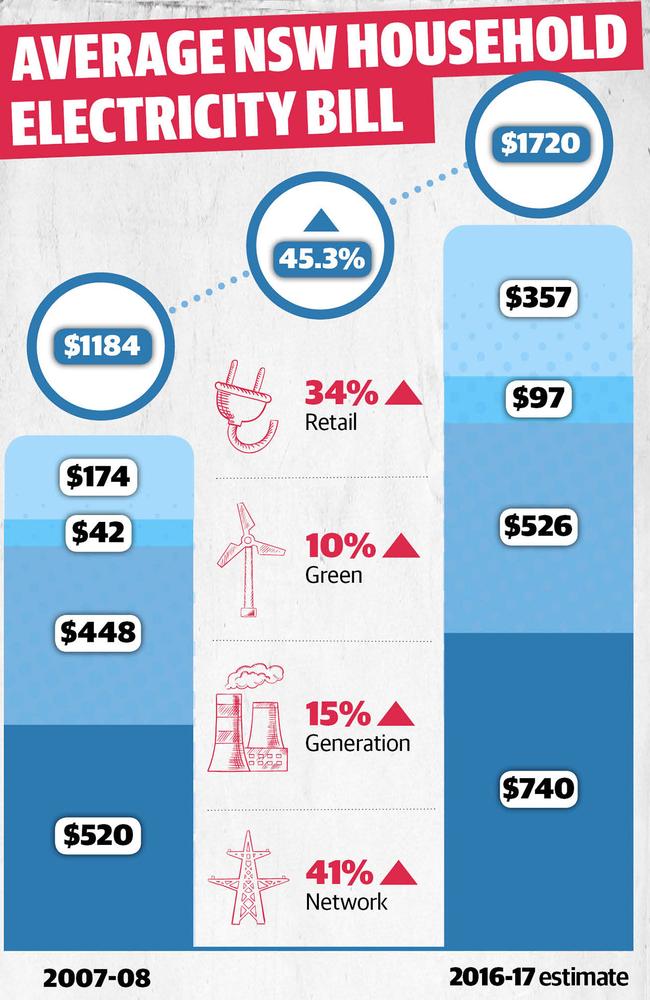Energy retailers keep consumers in dark to keep profits high
ELECTRICITY bills have skyrocketed more than 45 per cent in a decade as major energy companies con families and businesses with sneaky tactics to keep them from cheaper power.

NSW
Don't miss out on the headlines from NSW. Followed categories will be added to My News.
ELECTRICITY bills have skyrocketed more than 45 per cent in a decade as major energy companies con families and businesses with pointless “discounts” and sneaky tactics to keep them from cheaper power.
The nation’s competition watchdog has put major companies such as AGL and Origin on notice with a landmark report finding that some companies operated in a manner “designed to circumvent existing regulation” to increase prices.
The Australian Competition and Consumer Commission chairman Rod Sims told The Daily Telegraph the “large players” held the majority of market power and their exorbitant prices were a sign the market was broken.
“The retail offers are very confusing and you can often find that if you buy based on the biggest discount you end up paying more overall,” Mr Sims said.
“Often those big discounts are based on a very high base — a discount on what, is the question.”

The ACCC report shows the average power bill for NSW families rose from $1184 to $1720 in the past decade.
The price hike was driven by increases in retail and network costs — which rose 34 per cent and 41 per cent respectively — as well as smaller cost increases for green schemes and actual power generation.
The report notes the ACCC has “identified examples of retailers operating in ways that appear to be designed to circumvent existing regulation and examples of unintended consequences of regulation”.
Mr Sims said that one of the biggest issues was “evergreen contracts” that didn’t end even though discounts given to lure customers quickly expired.
“Electricity retailers were supposed to tell consumers now when their contracts were about to end and what they did was put them on these evergreen contracts,” he said
“To get them on to contracts they offered them a discount, but that only applied for one year and after that you lost the discount and in a sense didn’t know.”
“The retailers are often taking advantage of their most loyal customers because they have them on the evergreen contracts to avoid having to tell them when the contract ends.”
The report also identifies a “particularly problematic” practice of confusing discounting with no consistency, “making it difficult to determine which offer is best”.
Treasurer Scott Morrison said the ACCC report shows complicated deals were “making it difficult for Australians to shop around for better deals and compare electricity pricing offers”.
“The report made a number of recommendations the government will now consider, including that the costs of any future environmental schemes needed to be in proportion to the benefit they were trying to achieve,” Mr Morrison said.

The report comes as the Turnbull government finalises its response to the Finkel review into energy.
Energy Minister Josh Frydenberg is expected to take the issue to Cabinet today after last week suggesting the government would not proceed with a Clean Energy Target.
But Labor — which had earlier offered to work with the government on a CET — will walk away from negotiations if Mr Frydenberg decides not to pursue that option, favoured by Chief Scientist Alan Finkel.
Surry Hills renters Byron Saarinen and Jacqui Hudson, both 27, said they find the electricity market bills difficult to understand.
“They tell you your electricity bill will cost a certain amount and yet it always costs more,” Ms Hudson said.
Mr Saarinen said it was impossible to know which provider offered the best deal.
“You don’t have time to compare them all so you just end up picking one or sticking with whatever one you have,” he said.
KEY FINDINGS
1. By world standards, Australia’s electricity prices have become much more expensive than they were a decade ago.
2. Prices in NSW have jumped 45.3 per cent, which is far above inflation during that time.
3. There are serious concerns with larger electricity companies controlling the market.
4. Retailers have been found to be offering discounts to lure customers but off inflated or arbitrary prices.
6. Some retailers are also “operating in ways that appear to be designed to circumvent existing regulation”.


